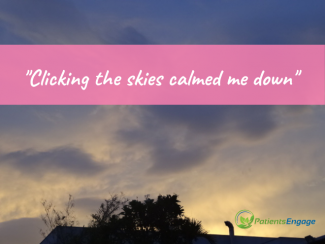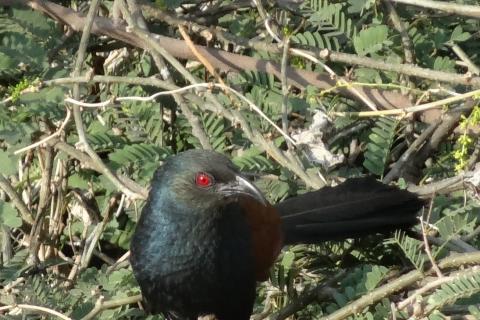
Nidhi Maini shares her many challenges with breast cancer, how she found solutions to deal with these challenges, what worked as well as what was not helpful. She also shares some of the photographs she took to help her cope.
I was diagnosed with breast cancer in August 2019, a few days after I turned 43. It came as a shock; well, it sounds cliched but, it was a bolt out of nowhere. I was living a fairly healthy life or so I believed. There was no indication of anything amiss till I accidentally found a lump in my breast and the rest is history.
Till I received my biopsy report, I was hoping against hope. The doctor had indicated what it was during my diagnostic exam but hope is a powerful thing. After the expected denial, crying, fear and a flurry of emotions on seeing the words “invasive ductal carcinoma” my husband and I sat down calmly to figure out what was needed.
Without going much into detail, the doctor advised lumpectomy followed by 8 chemotherapies and 21 radiation sessions. The entire treatment lasted about 8 months.
My Challenges:
The word Cancer evokes so much fear and confusion. Figuring the reports, treatment options, medical jargon, dealing with remedies sent by well-wishers that have no sound scientific basis, getting probed and prodded is also overwhelming. I am sharing a few challenges I faced and some things that helped me and some that didn't.
The Guilt:
As I mentioned earlier, I had assumed myself to be healthy as the usual parameters like BP, Blood sugar Levels and Heart were all fine. I had missed getting a Mammogram done after I turned 40. The guilt of not getting a mammogram done on time was my first reaction. I blamed myself and nobody else. I live in a metro city, have access to hospitals; there was nothing or nobody I could pass on the blame to.
Getting a mammogram on time would have possibly helped catch it at an earlier stage, reduced the intensity of my treatment and would have also saved my lymph nodes! I wish, I can say the guilt has gone but, even after the treatment is over and having recovered from most of the problems I faced due to my treatment, I still feel guilty!
Hair Loss
I'm sure most Cancer patients have a hair loss story to share. I knew from the day I was diagnosed with Cancer, that hair loss would happen. I had mentally prepared myself for the inevitable or, so I thought (again). I had assumed myself to be more evolved than being bothered about losing my hair. However, that was not the case; about 14 days after my first chemotherapy, I started losing my hair. I have or had voluminous hair. They started falling suddenly one night and, it was just non-stop after that. For the first day, it was not noticeable; the second day some bald patches appeared on my scalp, the third day the patches got pronounced and by the fourth day I was beginning to appear bald. I cried every night to sleep; I am not ashamed about it. It was when the reality of Cancer struck me, more than when I saw my biopsy report or when I went into the OT for my surgery.
The hair loss brought another challenge, dealing with my son. I got my head shaved in a parlour. Before that, I sat down and explained everything to my son who was 11 at that time. If I being an adult could not deal with it calmly; my son, just being 11 could hardly be expected to be cool about it. I would wear a scarf when I went outside but, at home, I would not wear it. My son would close his eyes or tell me to wear a scarf so that he could open his eyes. He didn't want to see my shaved head!
He told me not to come and pick him when his school van came to the apartment gate as all his van mates will get curious about me wearing a scarf.
The Pandemic
My radiation started just as the Covid pandemic was sweeping across the country and, the first lockdown started. I was in two minds about going to the hospital every day but, my doctor suggested that it is not advisable to postpone it. In hindsight, I think it was a good decision. Radiation involves lying in that machine for about 15-20 minutes, technicians and nurses putting on the plastic mesh or sheet etc. so, there was no way I could avoid touching surfaces or keep distance from people. I was paranoid, I would sanitise like mad, come home and shower and keep everything in the sun.
The radiation brought another set of challenges, skin darkening and swallowing troubles. Meeting the doctor due to Covid restrictions was difficult. I sought help online for my problems and, when nothing worked, emailed my medical oncologist, who offered some useful advice. My swallowing issues compromised my eating and drinking a lot. It was peak summer. I was advised to have a lot of liquids but, it was difficult to have even water till I figured out a "jugaad" to have liquids. (see Small Ideas Big Results below)
Another fallout of the pandemic was not being able to get my Chemoport removed. My last chemo was in March 2019; by mid-May, I finished my radiation. Due to various pandemic woes, my doctor suggested that I postpone my Chemoport removal surgery and, I still have it as I write this. I have to go every three months to get it flushed. Hopefully, I will be able to get it removed in the coming few days.
I also postponed my reviews by a few weeks on some occasions depending on the doctor’s advice and the pandemic situation. Going for reviews during the pandemic is very scary but I have tried to be as regular as possible.
What Helped Me?
Cancer treatment usually is a long process and figuring out ways to deal with small and big issues helped me in many ways.
Asking Questions:
I read my reports in detail, wrote down questions before I met my doctor. I tried to understand the prescribed line of treatment, why it was prescribed, what were the options and side effects. I asked follow-up questions, found out about the side effects and precautions. My doctors were more than happy to answer my questions and explain the process to me. Doing all this helped me being aware of what I was doing and what I should prepare for in terms of the side effects or possible outcomes. It also helped my family be a little more ready to deal with the consequences.
Being open:
I was open about my illness; I shared it with my friends and family right away. After the initial disbelief, in some cases, tears and the usual emotions, everyone around me was eager to help in any way. Being open helped me in two ways. It made it easier to ask for help and also lead my life as normally as possible.
Asking for help:
I live in a nuclear setup; no immediate family members were in the same city as me. I realised this is a battle that I could not win alone; I needed my army of well-wishers. I asked for help whenever I thought I needed it; my friends, neighbours, domestic help and of course my mother, husband and son all chipped in.
Planning Ahead:
Cancer treatment is overwhelming and, no amount of surfing the net or reading about it can prepare you for the actual issues. I knew I would lose my hair so; I ordered a few scarves online beforehand and am so thankful that I did that. On the days I had chemo, I would inform the school van driver and my friends in the apartment beforehand so that they could pick my son. During some part of the treatment my mother was not with me, on those occasions cooking ahead as I did not want to eat outside food helped me.
Exercise:
Okay, this seemed like an overrated cliche to me but, I stand corrected. Right from my surgeon; to the medical oncologist, nurses in the recovery room post-surgery, everyone told me to keep moving and exercise. I sometimes got irritated, especially when you are in pain and someone tells you to exercise it is not what you want to hear. However, now when I look back, exercising helped me in my overall recovery, staying occupied, dealing with lymphedema and regaining my strength. There were days when I could barely get through the day. Whenever my body allowed, I would do simple yoga postures, joint movements or just walk in the corridor. On good days I would do a half-hour walk, do some more intense yoga and walk to the nearby shop to buy fruits and groceries.
Carrying On With My Life
I lost my hair, my skin became dark and patchy, I even lost my eyebrows but, I did not think I should hide or confine myself to home. Whatever was possible and advisable as per my doctor, I did. I picked my son from school occasionally, went out with my friends and family, even travelled for a three-day trip out of town, did domestic chores as per my capability and carried on with my work.
Taking Care Of My Appearance
Becoming bald is the most visible sign of cancer treatment; I lost my eyebrows too. For the head, I kept experimenting with different types of scarves and caps. Some of them were really cool and trendy. I bought oversized glasses to cover my eyebrows. For the skin darkening I could not do much to hide it but stayed away from any harsh products.
Small Ideas Big Results:
For my swallowing issue, the humble saltwater gargles helped me. I also figured out I could place the straw in my mouth at a particular angle and have water and liquids without trouble. This required quite a few trials and errors. Always keeping some cardamon, dry ginger, nuts and seeds in my bag helped me deal with nausea and sudden dips in energy especially when waiting in the hospital for meeting the doctor or some test.
Involving My Son In The Process:
Engaging with my son and involving him in the process also worked for me. In the process we studied some biology too! After one or two chemo sessions he knew what days would be tough and by when I would start getting better. He shared my illness with his friends; most had an experience to share. He also started planning his work and schedule better so that on the days I was not available or feeling unwell he would not need to disturb me. After a few days he was cool with my shaved head and would check everyday if my hair were growing! He suggested me home remedies and oils too and helped me choose my scarves.
What Did Not Help Me?
No handbook can help you deal with Cancer, many people suffer from it and each figures out their coping mechanism. Some of the things that didn't work for me are:
- The barrage of alternative treatments; some of them bordering on the bizarre. They just confused me!
- Being told I would get better hair; like how and why?
- Avoiding pain killers and thinking I could deal with the pain. It is better to follow your doctor's advice.
- Trying to be brave; crying helped and I learnt it's okay to give in to my emotions and be weak at times.
- A wig; in hindsight, it was an itchy and funny experiment that failed miserably. My cotton scarves were a lifesaver.








